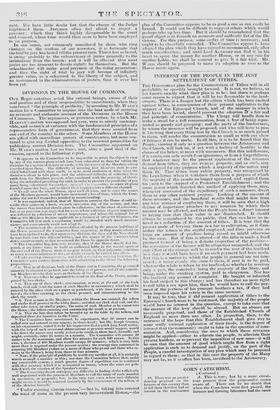INTEREST OF THE PEOPLE IN THE JUST SETTLEMENT OF TITHES.
Tim Government plan for the Commutation of Tithes will in all probability be speedily brought forward. It is not, we believe, as yet known exactly what their plan is to be; but there is perhaps some reason to expect that it will be too favourable to the laud- owners. There is a danger lest the odium which has been excited against tithes, in consequence of their present application to the support of the Episcopal Church, and of the manner in which they have been levied, should prevent the adoption of a fair and just principle of commutation. The Clergy will hardly dare to make a stand for a full compensation, from a fbar of being repre- sented as greedy and grasping; and the party of the landowners, by whom the measure will be proposed, and who will liaise to pass it, knowing that every thing lost by the Church is so much gained to them, will render the commutation as stnall as with any show of thiruess it can be made. In all this, it is to be feared that the People, viewing it only as a question between the Aristocracy and the Church, will look on, if not with a feeling of hostility to the claims of the latter, at most with unconcern. But this inditlerence, if it exists, can only result from ignorance, or from a forgetfulness, that whatever may be the present application of the revenues derived from tithes, they are PUBLIC property, and as such, may be employed for any purpose which a majority of the nation may think fit. That tithes were public property, was recognized by the Legislature when it withdrew them from a purpose of which the majority of the people no longer approved, and applied them (in Dart) to the support of a Protestant Establishment ; and the same poorer which directed this method of applying them, may, whenever convinced of the expediency of' such a measure, divert them to any other national purpose. Looking at the amount of these revenues, and the beneficial results that might flow from any wise manner of employing them, it will be seen that a high degree of importance attaches to any measure by which their amount may be af ected. and that the People have a direct interest in taking care that their value is -not diminished. It should always be remembered by the public, that they can have no in- terest in a reduction of the amount of tithes. It is true that the present mode of levying them is a bar to cultivation, as it dimi- nishes the return to the capital employed, and thus prevents so large an amount of produce being raised as might otherwise he the case. But if this is altered—if the tithe is made a fixed payment instead of being a definite proportion of the produce— the operations of the farmer will be altogether unimpeded, and the only a fleet of the ehange will be to render the rent of the landlord le1,5 than it weidil have been it' no such payment had been made. But this is a matter in which the people in general are not inte- rested ; it being clearly the same to them, if rent is to be paid, whether the whole is taken by the landlord, or whether he receives only a part, the remainder being the property of the State, and being, under the existing system, paid to clergymen. Nor has the landlord any ground of complaint. He bought or inherited his land subject to this charge; and has therefore no more right to call tithe a tax upon him, than he would have to call the pay- ment of the portions of his younger brothers a tax, if they had been imposed upon his estate in the same manner. It may be true, that it' the-present application of tithes to the Episcopal Church were to be continued, the majority of' the people would have no interest in the question, except to take care that the manner of the levy should be altered. But no abuses are necessarily perpetual, and those of the Established Church of England no more than any other. In proportion, then, to the nearness of the hope that this Establishment shall give way to seine really national application of their funds, is the degree of interest that the community ought to take in the question of com- mutation. And, considering the uses to which these revenues might be applied—either to educate the people, to alleviate their present burdens, or to prevent the imposition of new ones—it will be seen that the amount of good which might flow from a right application is such as to demand and justify, on the part of the People, a careful investigation of any plan which may be proposed in regard to them ; so that in this case the property of the Many may not be, as it so often has been, sacrificed to the Aristocracy.
















 Previous page
Previous page